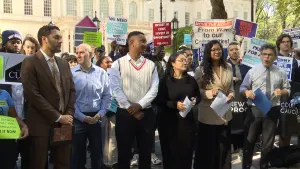More Stories
A letter written by a World War II soldier that was lost for decades is now in the hands of that soldier’s family.
News 12 New Jersey first reported that the letter written by Pfc. Walter Berezansky was found in a Somerville antique shop. The man who found the letter would not open it until a surviving family member was found. On Monday, Berezansky’s niece Sandra Taylor was presented with the letter.
“This was written to my grandmother,” Taylor says.
Berezansky wrote the letter while in Belgium in December 1944. He wrote it for his parents in Clifton.
“I hope this letter finds you all in the best of health. As for myself, I am safe and sound,” the letter stated.
“[My uncle] was a very quiet man. He didn’t speak much,” Taylor says. “The only thing I can remember that he might have said about the war was how he would wake up in the middle of the night and bang his head against the wall. I said, ‘Did you have PTSD?’ He said, ‘Probably.’”
Berezansky's letter, somehow lost for decades, was found in a Somerville Antique shop by William Daniels, who turned it over to Kevin Gorman, commander of the Athenia Veterans Post in Clifton.
Gorman didn't once think once of opening it until it landed in the hands of a family member. That became possible when Taylor saw the News 12 story about the lost letter addressed to her grandmother.
“I was so shocked when I saw it on the Facebook page. I was scrolling down and was like, ‘That’s my grandma,’” Taylor says.
Berezansky wrote the letter in Belgium on the first day of the Battle of the Bulge, the largest and bloodiest battle of World War II. About 18,000 of Berezansky's fellow American soldiers would die in the days to come.
Berezansky only hints at the horrors and looming danger. He mentions the weather and thanks his parents for a care package of Loft's candies they had sent. He then mentions the massive German counter offensive underway, writing, “Everyone here are really on their toes.”
Then after thanking his parents for the care package they had sent, he adds, "some of the boys in other outfits got packages from home too like I did. But they didn't have a chance to open them. The Germans opened them for them."
More from News 12
2:34

Guide: Safety tips to help prevent home burglaries
2:19

Guide: Safety measures to help prevent fires and how to escape one
2:40

Mayor's budget cuts: A controversial solution amidst immigration crisis
2:07

Tips on how to avoid confrontation with sharks while swimming in the ocean
2:33

5 tips to prevent mosquito bites and getting sick from viruses
2:39
